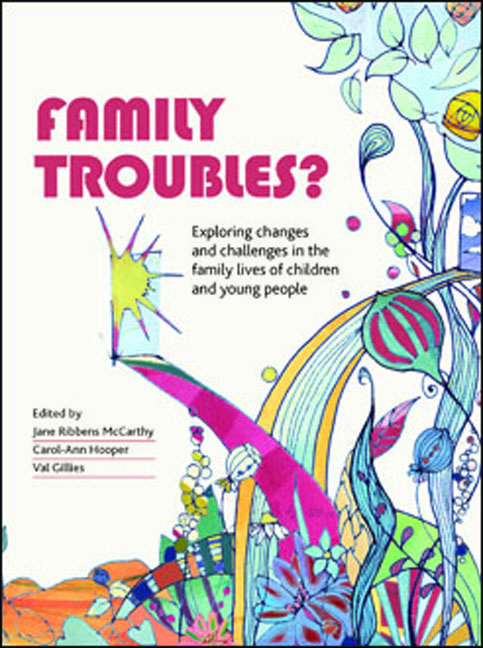Book contents
- Frontmatter
- Contents
- Notes on contributors
- Foreword
- Preface
- 1 Troubling normalities and normal family troubles: diversities, experiences and tensions
- Part One Approaching family troubles ? Contexts and methodologies :Introduction to Part One
- Part Two Whose trouble ? Conteste d definitions and practice: Introduction to Part Two
- Part Three The Normal, The Troubling And The Harmful?: Introduction to Part Three
- Part Four Troubles and transitions across space and culture: Introduction to Part Four
- Part Five Working With Families: Introduction to Part Five
- Index
16 - ‘Troubling’ or ‘ordinary’? Children's views on migration and intergenerational ethnic identities
Published online by Cambridge University Press: 07 September 2022
- Frontmatter
- Contents
- Notes on contributors
- Foreword
- Preface
- 1 Troubling normalities and normal family troubles: diversities, experiences and tensions
- Part One Approaching family troubles ? Contexts and methodologies :Introduction to Part One
- Part Two Whose trouble ? Conteste d definitions and practice: Introduction to Part Two
- Part Three The Normal, The Troubling And The Harmful?: Introduction to Part Three
- Part Four Troubles and transitions across space and culture: Introduction to Part Four
- Part Five Working With Families: Introduction to Part Five
- Index
Summary
Migration leads to experiences of discontinuity for families as they make sense of the differing societal circumstances and norms of the societies of origin and residence. Members of the migrant family face the challenge of integrating diverse experiences into a renewed sense of belonging both within the family and the wider society of residence. In the process of migration, family members elaborate new meanings and ways of being a ‘mother’, ‘daughter’, ‘father’, ‘sister’ and so on. The members of migrant families may have diverse linguistic and cultural competences. At times, children may have different notions of ethnic identity from those of their parents, and, in these circumstances, parents are challenged to question their own ethnic identification. These dynamic and fluid processes are often overlooked in representations of migrant families as either dysfunctional or steeped in ‘tradition’ (cf Erel, 2002; Kraler, 2010). Indeed, the experience of migration is often assumed to be troubling, both for individual family members and for the composition of the family.
This chapter explores how the experience of migration and settlement in the UK is constituted as ‘troubling’ or ‘ordinary’ through a focus on children's narratives, exploring the ways in which they complicate notions that migration troubles intergenerational ethnic identities. While differences in ethnic identification can certainly be troubling for some migrant families, here I explore how children engage in ‘generation work’ (Inowlocki, 1995). This ‘generation work’ consists of mutual efforts of migrants to discursively construct continuity between family members, despite their different experiences of migration. This is an important part of coping with these troubles.
During the 1970s and 1980s, a key explanation for the ‘failed’ integration of migrant young people was the so-called culture or generation clash. This assumed that parental attitudes and orientations towards a presumed culture of the homeland prevented young people from integrating. This has been critiqued for relying on a simplistic view of culture and family, failing to consider their dynamic and negotiated qualities. However, social policy and public debate in the UK has recently delegitimised multiculturalist notions of ethnic plurality; instead, increasingly legitimating new forms of assimilationism (Back et al, 2002). In this context, the migrant family ‘is increasingly seen as an obstacle to integration – as a site characterised by patriarchal relationships and illiberal practices and traditions such as arranged and forced marriages’ (Kraler, 2010).
- Type
- Chapter
- Information
- Family Troubles?Exploring Changes and Challenges in the Family Lives of Children and Young People, pp. 199 - 208Publisher: Bristol University PressPrint publication year: 2013

